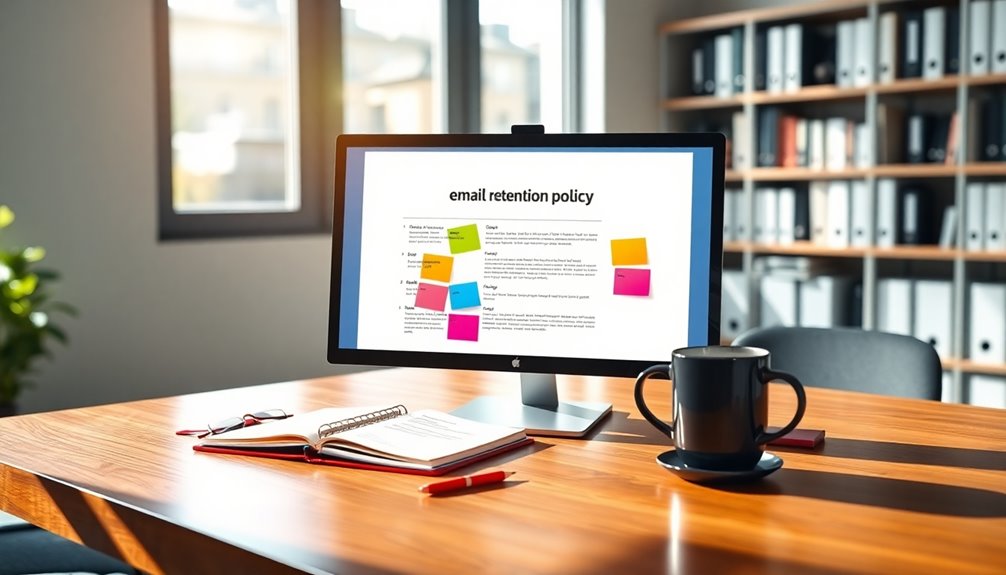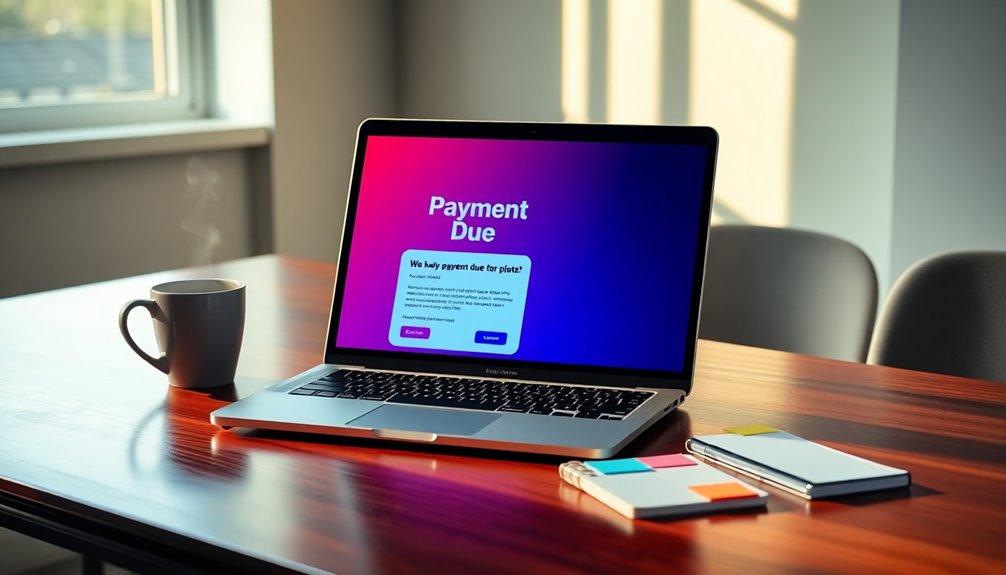An effective email retention policy template can save you time and help protect your organization's valuable data. Start by defining categories for your emails and their retention duration, ensuring compliance with regulations like Sarbanes-Oxley and HIPAA. Clearly outline responsibilities for employees and provide training to help them understand the importance of accurate email management. Automate the archiving process to minimize errors and enhance data retrieval efficiency. This structured approach not only mitigates legal risks but also fosters accountability. Stick around, and you'll discover more tips to streamline your email retention strategy effectively!
Key Takeaways
- Create a clear email retention policy template that outlines specific retention durations based on regulatory requirements for different email categories.
- Incorporate automated archiving solutions in your template to minimize human error and streamline the data management process.
- Define email categories such as Administrative, Fiscal, General, and Ephemeral, detailing retention periods for each to ensure compliance.
- Engage key stakeholders in the policy development process to ensure comprehensive coverage and alignment with organizational needs.
- Regularly review and update the template to adapt to changing regulations and maintain compliance, protecting the organization from legal risks.
Introduction
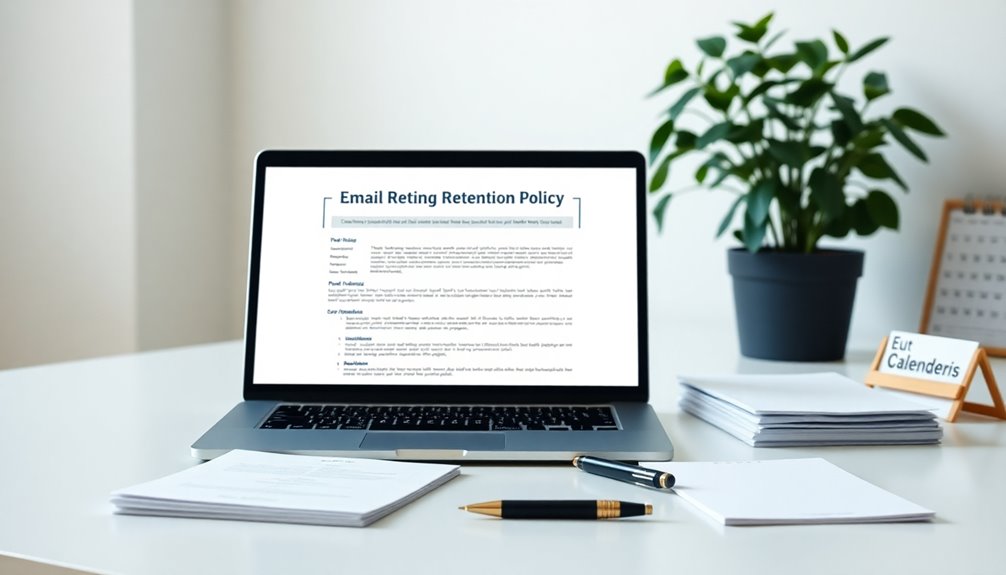
In today's digital landscape, having a solid email retention policy is crucial for your organization. This policy not only addresses legal and regulatory requirements but also aligns with your compliance goals. By implementing a structured email retention policy, you can establish clear guidelines on retention duration for different types of emails, which aids in effective data management.
Utilizing an email retention policy template simplifies the policy creation process, saving you time and ensuring that all essential elements, like classification and retention duration, are included. This streamlined approach helps you reduce risks associated with data breaches and non-compliance, safeguarding your organization from potential legal pitfalls.
Moreover, a well-defined email retention policy enhances your information governance, making it easier to organize and retrieve emails during eDiscovery processes. You'll find it simpler to locate critical communications when you have a clear framework in place.
Regularly reviewing and updating your email retention policy template is vital for maintaining compliance with evolving regulations and adapting to your organizational needs. By prioritizing this aspect of email management, you set your organization up for success in navigating the complexities of the digital world.
Regulatory Compliance and Risk Management
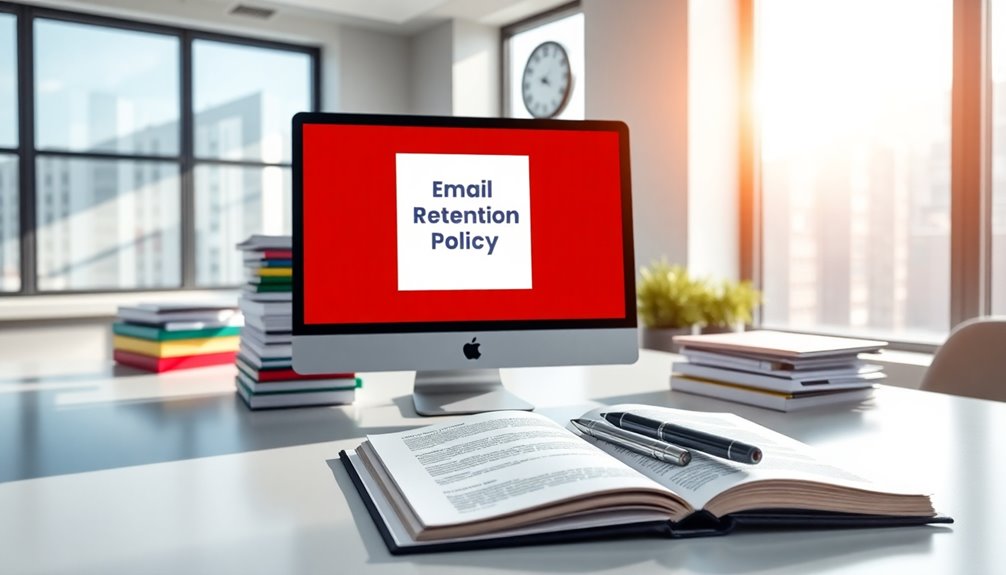
Regulatory compliance is vital for any organization, especially when it comes to email retention policies. Adhering to specific retention periods dictated by laws like Sarbanes-Oxley and HIPAA ensures that you meet your legal obligations.
For instance, financial records must be retained for up to seven years, while patient records require six years of retention. Failing to comply can lead to hefty penalties and reputational damage—83% of U.S. companies faced data breaches in 2022, costing an average of $4.45 million per incident. Implementing robust fraud detection measures can further enhance your compliance efforts and protect sensitive information.
An effective email retention policy not only protects you from these compliance risks but also supports eDiscovery processes. By ensuring timely access to relevant communications during legal proceedings, you can respond appropriately to inquiries.
Regular audits and monitoring of your email retention practices are essential for maintaining compliance. These measures help identify potential risks associated with data mismanagement, reducing your liability.
Remember that legal holds significantly impact your retention policy. During litigation, all relevant communications must be preserved, preventing automatic deletions and safeguarding your organization during legal disputes. Additionally, understanding cookie categories can aid in managing data privacy effectively.
Clear Subject Line Guidelines

Effective email communication isn't just about what you say; it's also about how you say it. Clear subject lines play a crucial role in enhancing retrieval efficiency, allowing you to quickly locate messages during audits or eDiscovery processes.
To ensure your emails align with your email retention policy, make your subject lines concise yet descriptive. Include relevant keywords that reflect the content and purpose of your email, which will improve categorization in your archiving systems.
Consider incorporating standardized prefixes, like "ACTION: ", "FYI: ", and "URGENT: ", to help prioritize emails and streamline communication within your team. Consistency in subject line formatting not only fosters effective data management but also boosts compliance with email retention policies by creating recognizable patterns for everyone.
Training employees on these effective subject line practices is essential. It can significantly reduce the time spent searching for emails—studies show that workers typically waste about 9.4 hours per week on this task. Additionally, implementing AI-driven analytics can further enhance email organization and retrieval processes by providing insights into email usage patterns.
Step-by-Step Guide to Writing Policies

Writing a policy on email retention requires a structured approach, ensuring you cover all essential aspects. Start by researching applicable legal requirements that dictate retention periods for emails. This foundation will guide your retention policy, helping you determine how long different types of correspondence—like Administrative, Fiscal, General, and Ephemeral—must be retained.
Next, clearly define these categories and their specific retention durations. To minimize human error, establish a framework for archiving solutions that automatically retain emails according to predetermined timelines. This will streamline the process significantly.
Involve key stakeholders, including legal, IT, and compliance teams, throughout the policy drafting process. Their insights will help ensure comprehensive coverage and alignment with organizational needs.
Pro Tips for Maximizing Impact
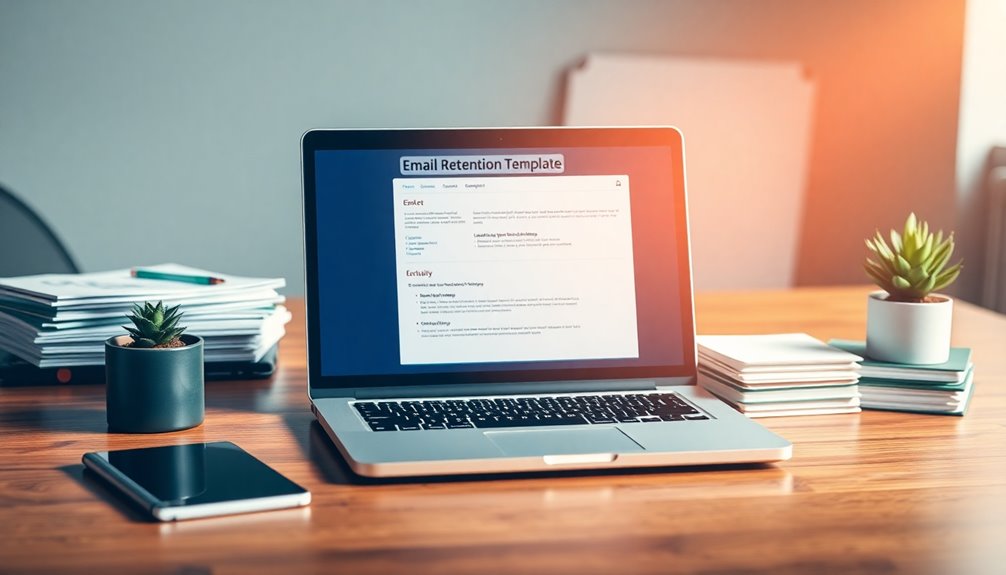
To truly maximize the impact of your email retention policy, you should kick off by implementing automated archiving solutions. These tools streamline your email retention processes, reduce human error, and ensure legal compliance with your retention policy.
Regularly review and update your policy to align with evolving regulatory requirements, minimizing the risk of non-compliance and potential penalties.
It's crucial that employees must understand the importance of email retention. Train them on the specifics of the policy to foster a culture of compliance and accountability within your organization. This not only enhances individual responsibility but also strengthens the overall adherence to your retention needs.
Involving key stakeholders from IT, legal, and compliance teams during the policy development process ensures comprehensive coverage and organizational buy-in. Their insights are vital in crafting a robust retention policy that meets all necessary legal standards. Additionally, consider leveraging automated tools to enhance compliance and efficiency in your email management practices.
Common Mistakes to Avoid
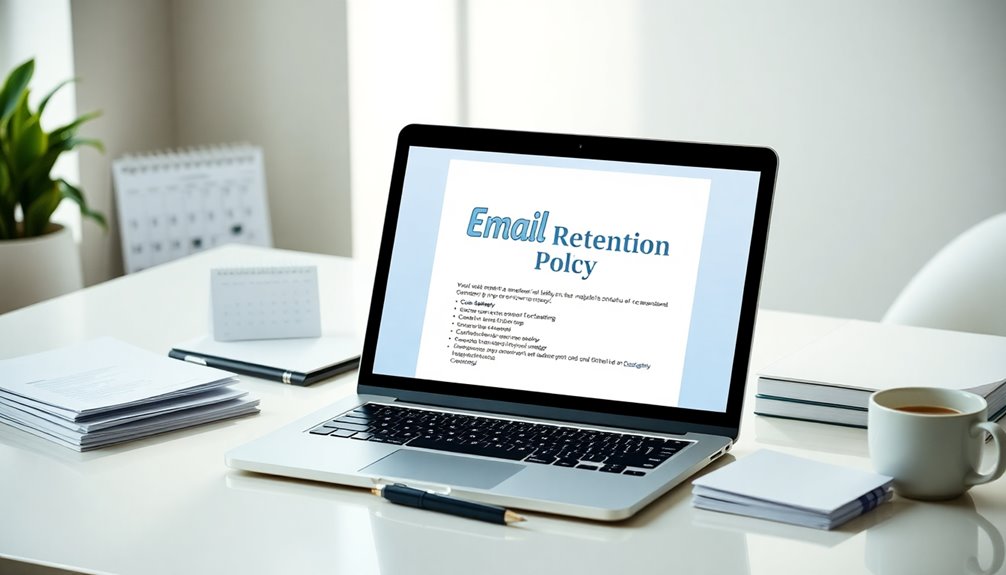
When crafting an email retention policy, it's easy to fall into common pitfalls that can undermine its effectiveness. One major mistake is failing to clearly define what constitutes a record. This can lead to confusion about retention requirements, resulting in unnecessary data retention or the premature deletion of important emails.
Another common mistake isn't involving key stakeholders, like your Legal and IT teams, in the policy development process. Without their input, you risk gaps in legal compliance, which could increase the likelihood of legal penalties.
Additionally, overlooking the need for tailored retention periods for different types of correspondence can lead to non-compliance with regulations such as HIPAA and SOX, which have strict data retention requirements.
Neglecting to implement automated archiving solutions is another critical error. This can increase human error in email management, complicating compliance tracking and risking data loss.
Finally, failing to provide adequate employee training can cause misunderstandings and non-compliance, jeopardizing your organization's legal standing.
Fiscal Email Retention Template

Establishing a clear Fiscal Email Retention Template is essential for maintaining compliance and ensuring efficient management of your organization's financial correspondence.
Your retention policy should specify that all emails related to revenue and expenses, categorized as Fiscal Correspondence, must be retained for a minimum of four years. This duration is critical for meeting regulatory requirements and providing necessary documentation during financial audits or investigations.
To streamline this process, your IT department should manage the retention of Fiscal Correspondence by monitoring emails that are cc'd to fiscal@Company Name. This ensures proper archival and compliance with established guidelines.
As an employee, you play a vital role in this process by identifying and categorizing emails correctly.
Failing to adhere to the Fiscal Email Retention policy can result in severe disciplinary actions, including potential termination. It's crucial that you understand the importance of retaining emails accurately and consistently.
By following these guidelines, you not only safeguard your organization's financial integrity but also protect yourself from any compliance-related repercussions.
Final Thoughts
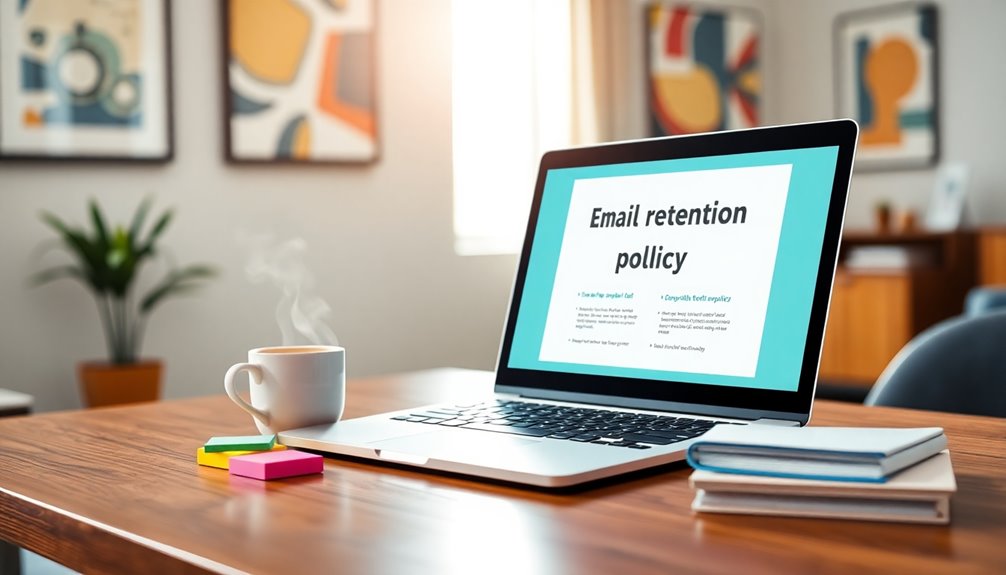
As you reflect on the importance of an email retention policy, it's clear that a well-structured approach is vital for compliance and effective data management.
Establishing clear retention durations based on regulatory requirements, such as HIPAA and Sarbanes-Oxley, is essential for meeting legal obligations concerning sensitive data. Automating the email retention process can significantly reduce human error, streamline data management, and make retrieval easier during legal discovery.
Regular reviews of your retention policy are crucial for adapting to changing regulations and business needs. Engaging key stakeholders in the development of the policy fosters organizational buy-in, leading to stronger compliance and governance.
Moreover, incorporating employee training on the retention policy enhances understanding and adherence, minimizing the risk of mismanagement.
Frequently Asked Questions
What Is the Best Practices Email Retention Policy?
To create an effective email retention policy, establish clear retention durations, engage stakeholders, automate archiving, train employees regularly, and conduct audits. This approach ensures compliance, organization, and accountability within your communication practices.
How to Create a Data Retention Policy?
To create a data retention policy, identify legal requirements, define record types, engage stakeholders, implement automated systems, and regularly review the policy. This ensures compliance and relevance to your organization's needs and changes.
What Is an Example of a Data Backup Retention Policy?
A data backup retention policy might state you'll keep full backups for six months and incremental backups for one month. Regular audits ensure compliance, while automation tools help manage storage and deletion efficiently.
How to Manage Email Retention?
To manage email retention, categorize emails by type, automate archiving, train employees on compliance, and regularly review your policies. Monitor practices closely to ensure adherence and adjust to changing regulations and organizational needs.
